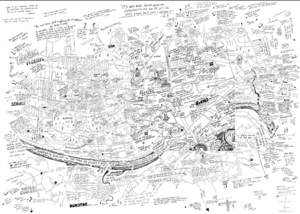User:Zpalomagar/RESEARCH: Difference between revisions
Zpalomagar (talk | contribs) |
Zpalomagar (talk | contribs) |
||
| Line 5: | Line 5: | ||
Imaging Homelessness in a City of Care was a participatory mapping project undertaken with 30 single homeless people in Newcastle-upon-Tyne (UK) in 2014. The project’s objectives were threefold: to pilot an innovative mapping-based methodology; to offer single homeless individuals an opportunity to comment on local service provision and delivery; and to inform and challenge public perceptions of homelessness. In what follows, we outline the context for the project and the reasons for adopting a mapping approach. We then discuss the research process and the various insights generated. Finally, we reflect on the effectiveness of the methodology used. | Imaging Homelessness in a City of Care was a participatory mapping project undertaken with 30 single homeless people in Newcastle-upon-Tyne (UK) in 2014. The project’s objectives were threefold: to pilot an innovative mapping-based methodology; to offer single homeless individuals an opportunity to comment on local service provision and delivery; and to inform and challenge public perceptions of homelessness. In what follows, we outline the context for the project and the reasons for adopting a mapping approach. We then discuss the research process and the various insights generated. Finally, we reflect on the effectiveness of the methodology used. | ||
[[File:Homelessness.png|300px | [[File:Homelessness.png|300px|center]] | ||
Revision as of 09:23, 30 September 2019
PROJECT REFERENCES
Imaging Homelessness in a City of Care
Imaging Homelessness in a City of Care was a participatory mapping project undertaken with 30 single homeless people in Newcastle-upon-Tyne (UK) in 2014. The project’s objectives were threefold: to pilot an innovative mapping-based methodology; to offer single homeless individuals an opportunity to comment on local service provision and delivery; and to inform and challenge public perceptions of homelessness. In what follows, we outline the context for the project and the reasons for adopting a mapping approach. We then discuss the research process and the various insights generated. Finally, we reflect on the effectiveness of the methodology used.

